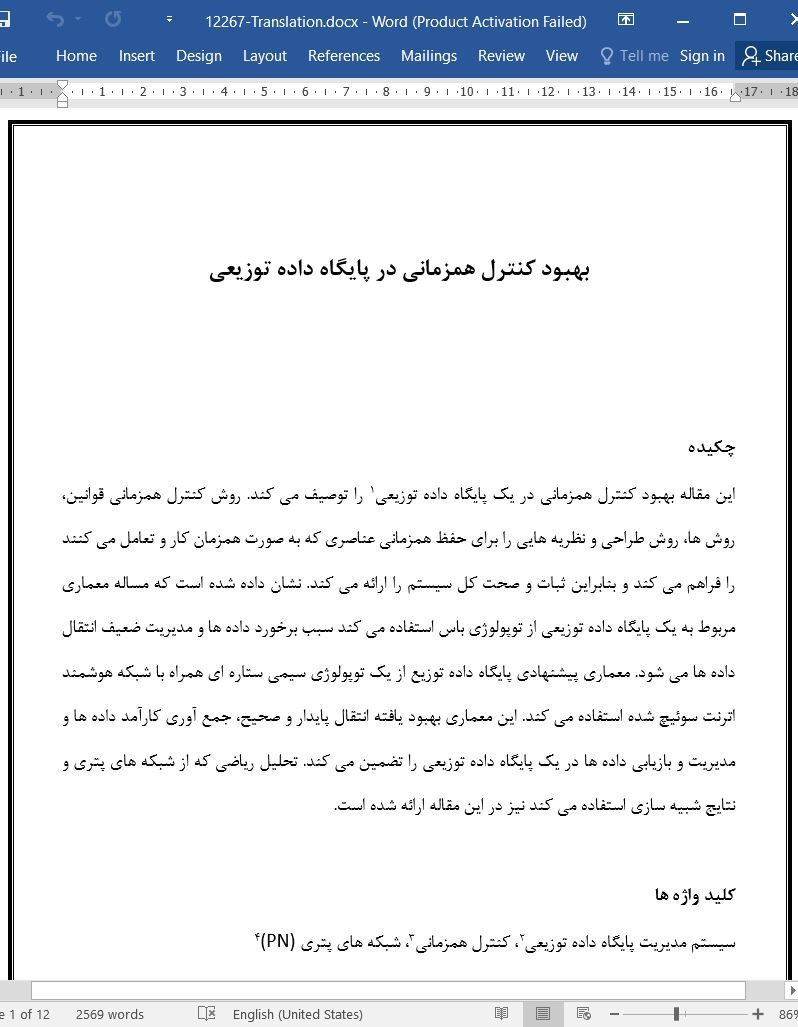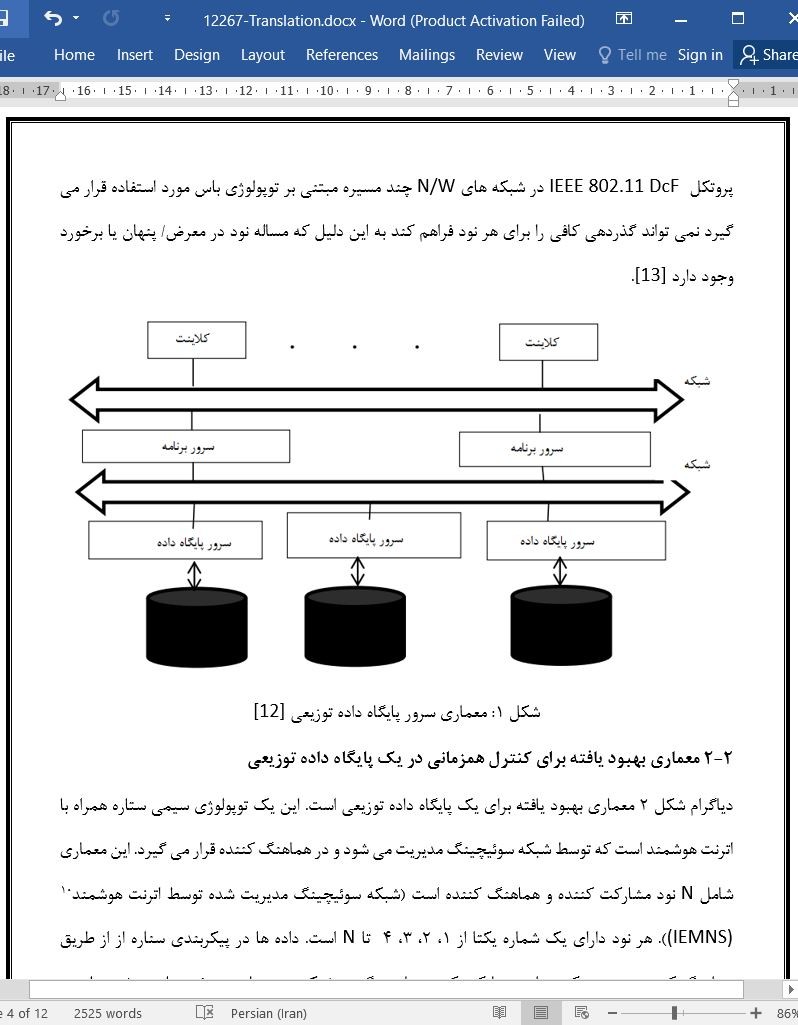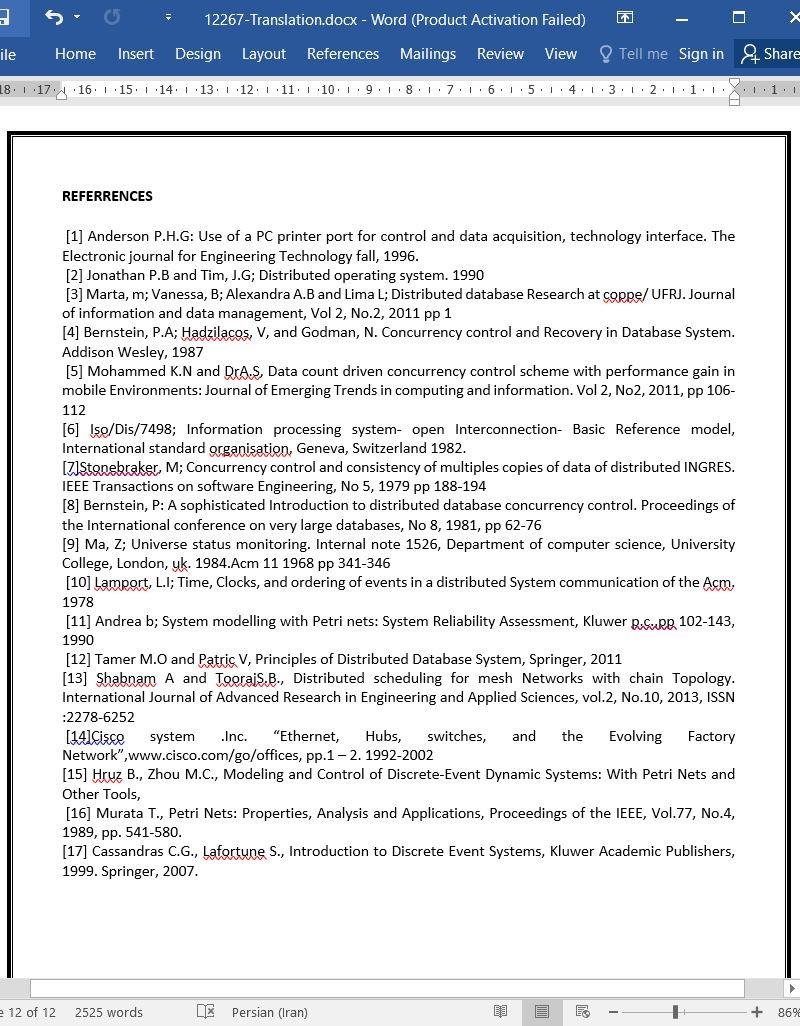
بهبود کنترل همزمانی در پایگاه داده توزیعی
چکیده
این مقاله بهبود کنترل همزمانی در یک پایگاه داده توزیعی را توصیف می کند. روش کنترل همزمانی قوانین، روش ها، روش طراحی و نظریه هایی را برای حفظ همزمانی عناصری که به صورت همزمان کار و تعامل می کنند را فراهم می کند و بنابراین ثبات و صحت کل سیستم را ارائه می کند. نشان داده شده است که مساله معماری مربوط به یک پایگاه داده توزیعی از توپولوژی باس استفاده می کند سبب برخورد داده ها و مدیریت ضعیف انتقال داده ها می شود. معماری پیشنهادی پایگاه داده توزیع از یک توپولوژی سیمی ستاره ای همراه با شبکه هوشمند اترنت سوئیچ شده استفاده می کند. این معماری بهبود یافته انتقال پایدار و صحیح، جمع آوری کارآمد داده ها و مدیریت و بازیابی داده ها در یک پایگاه داده توزیعی را تضمین می کند. تحلیل ریاضی که از شبکه های پتری و نتایج شبیه سازی استفاده می کند نیز در این مقاله ارائه شده است.
1.مقدمه
رایانه و کاربردهای گوناگون آن در سال های اخیر شاهد انقلابی شگرف بوده است. موفقیت عظیم آن به دلیل انعطاف پذیری و قابلیت اطمینانی است که سیستم رایانه ای به کاربران بالقوه ارائه می کند [1]. مطابق با مقاله [2]، دهه اخیر شاهد ایجاد و توسعه سریع حوزه سیستم های رایانه ای توزیعی بوده است. این توسعه به دلیل نیروهای فنی و اجتماعی بوده است و به نظر می رسد که فشار این دو نیرو همچنان ادامه خواهد داشت. کسب و کارها در طی بیست سال فعالیت های پردازشی خود را به صورت آنلاین ارائه کرده اند. بسیاری از کسب و کارها همانند خطوط هواپیمایی و بانک ها بدون وجود سیستم های رایانه ای برخط نمی توانند کارکردی داشته باشند. پایگاه داده برخط آن ها می بایست همواره به روز و صحیح باشد.
4. نتیجه گیری
هدف کلی کنترل همزمانی فراهم سازی قوانین، روش ها، روش طراحی و نظریه ها به منظور حفظ سازگاری همزمانی عملیات عناصر و تعامل آن ها است و در نتیجه سازگاری و صحت سیستم پایگاه داده توزیعی است. این کار بهبود کنترل همزمانی در یک پایگاه داده توزیعی را مورد مطالعه قرار داده است. براساس تحلیل و نتیجه، مشاهده می شود که کنترل همزمانی در یک پایگاه داده توزیعی به میزان 77 درصد بهبود یافته است. نتایج حاصل از تحقیق نشان داده است که بهبود کنترل همزمانی در یک پایگاه داده توزیعی قابل دستیابی است.
ABSTRACT
This paper presents an Improvement on concurrency control in a distributed database. Concurrency control approach provides rules, methods, design methodology and theories to maintain the consistency of components operating concurrently while interacting and thus the consistency and correctness of the whole system. It is shown that the problem of existing architecture of a distributed database uses bus topology that causes data collision and poor management of data transaction. The proposed architecture of the distributed database uses a star-wired topology with Intelligent Ethernet managed switches Network. This improved architecture ensures consistent and correct transaction, efficient data collection and management and recoverability of data in a distributed database. The mathematical analysis that uses Petri-nets and simulated results are also presented in the paper.
1 INTRODUCTION
Computer and its diverse applications have in recent times witnessed a revolution. Its enormous success is due largely to the flexibility and reliability that computer system offer to potential users [1]. According to [2], the last decade has seen the creation and rapid expansion of the field of distributed computing systems. This has been driven by both technical and social forces and it seems likely that the pressure from both will continue for some time yet. For over 20 years, businesses have been moving their Data processing activities on line. Many businesses, such as airlines and banks, are no longer able to function when their on-line computer system are down. Their on-line database must be up-to-date and correct at all times.
4 CONCLUSION
The general purpose of concurrency control is to provide rules, methods, design methodology and theories to maintain the consistency of components operating concurrently while interacting, and thus, the consistency and correctness of the distributed database system. This work has studied on the improvement of concurrency control in a distributed database. From the analysis and results, it can be seen that, the concurrency control in a distributed database has been improved by 66.7%. The research results indicated that improvements on concurrency control in a distributed database is achievable.
چکیده
1.مقدمه
2. روش کار
1-2 معماری یک سیستم مدیریت پایگاه داده توزیعی (DBMS)
2-2 معماری بهبود یافته برای کنترل همزمانی در یک پایگاه داده توزیعی
3-2 روش طراحی شبکه پتری
1-3-2 دیاگرام شبکه پتری یک طرفه برای برای کنترل همزمانی
2-3-2 مدل ریاضیاتی برای کنترل همزمانی یک طرفه
3-3-2 دیاگرام شبکه پتری دو طرفه برای کنترل همزمانی
4-3-2 مدل ریاضی برای جهت گیری رو به جلو دو طرفه
5-3-2 مدل ریاضی برای هدایت رو به عقب دو طرفه
3. نتایج و بحث
1-3 گراف کنترل همزمانی موجود در یک پایگاه داده توزیعی
2-3 جهت گیری بهبود یافته رو به عقب دو طرفه
4. نتیجه گیری
منابع
ABSTRACT
1 INTRODUCTION
2 METHOD
2.1 Architecture of a distributed Database management system (DBMS)
2.2 An Improved Architecture for concurrency control in a distributed database
2.3 Petri net design approach
2.3.1 Existing One-way Petri net diagram for concurrency control
2.3.2 Mathematical Model For An Existing One-Way Concurrency Control
2.3.3 Improved Two-way Petri net diagram for concurrency control
2.3.4 Mathematical Model For The Improved Two- Way Forward Direction
2.3.5 Mathematical Model For The Improved Two Way Backward Direction
3 RESULTS AND DISCUSSION
3.1 Graph of the Existing concurrency control in a distributed database
3.2 Improved TWO-WAY backward direction4 CONCLUSION
REFERRENCES
- ترجمه فارسی مقاله با فرمت ورد (word) با قابلیت ویرایش، بدون آرم سایت ای ترجمه
- ترجمه فارسی مقاله با فرمت pdf، بدون آرم سایت ای ترجمه



